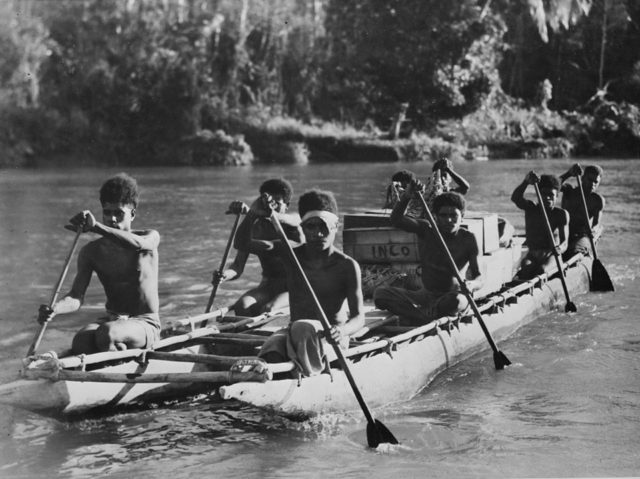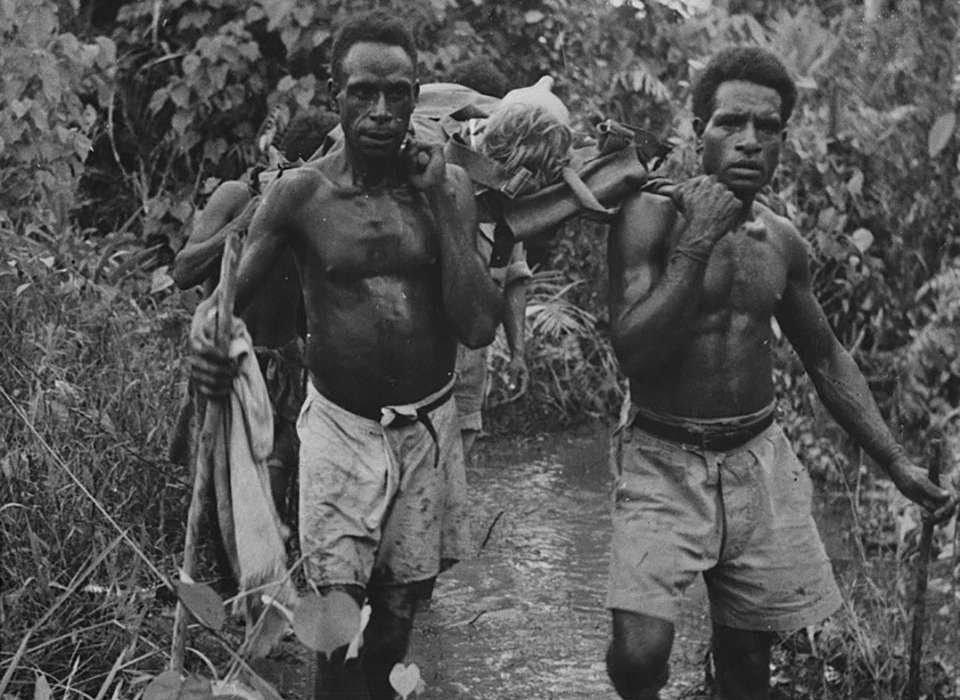For the white Australian and American (and some African American) troops who fought there, New Guinea was one of the most horrific battlegrounds of World War II. Dense jungles, intense heat, disease, and fierce Japanese resistance all combined to make service on the island—the second largest in the world—a misery.
And it lasted a long time: From March 8, 1942, when Japanese forces first landed on the island, to the end of World War II in the summer of 1945, fighting took place across the island of New Guinea and in its nearby island chains.
The worst suffering, though, was endured by the indigenous peoples of New Guinea, from what is now the independent country of Papua New Guinea in the east, to West Papua, now part of Indonesia.
The population during World War II was about 1.5 million people, descended from the island’s first human inhabitants from tens of thousands of years ago, and divided up into numerous tribes. These people possessed rich cultures, and under the pressures of war they would display remarkable courage as well as kindness and compassion. To the invaders from Japan, and the occupiers from Australia and the United States, however, New Guineans appeared as colonial subjects at best, and as slaves at worst.
The Japanese frequently treated New Guineans with extreme brutality, just as they did other indigenous peoples across Asia. Food was always scarce, and Japanese forces arriving in native villages often simply requisitioned all the food they wanted, murdering some villagers and leaving the rest to starve.
US Marine Robert Leckie, in his memoir Helmet for My Pillow, described encountering an entire village of native people, men, women, and children, who had fled the Japanese: “Some were hobbling on rude crutches made from sugar cane, some—the ancients—were borne aloft on litters, some were supported by the more stalwart among them; all had been reduced by starvation to mere human sticks.”
Many of their men were missing, having been forced by the Japanese into slave labor. In other villages, Japanese occupation was not much worse than it had been under the Australians. Even so, in the ensuing campaigns, more Japanese soldiers would die of starvation than from any other cause.

Before World War II began, the island of New Guinea fell under Australian administration. Then, and after fighting began, the Australian authorities treated native peoples as children—not to be brutalized, certainly, but also not to be regarded as capable of running their own affairs.
The Australians primarily regarded native New Guineans as sources for supply and labor. Some offered to work voluntarily. Others were forcibly conscripted into service of one kind or another. As many as 37,000 New Guineans were working as forced labor at any given time during the war.
One Australian official remarked in 1942 his opinion that “these natives will respond to force and command, but they will not be coaxed.” As fighting ramped up, however, particularly along the legendary Kokoda Track from the Owen Stanley mountain range to the vital post at Port Moresby, the Australians discovered a new dimension to the Papuan peoples.
Australian forces fighting the Japanese in this forbidding region suffered heavy casualties, and often in the course of fighting wounded men became separated from their units, or isolated away from adequate medical care. Those captured by the Japanese could expect long, horrific imprisonments, if they weren’t killed outright.
Natives, though, treated wounded and lost Australians with great kindness, providing them with food and shelter or carrying them many miles back to the Allied lines—all at great risk to themselves, and for no rewards asked or promised. Australians took to calling the New Guineans “Fuzzy Wuzzy Angels,” and journalists made much of their heroism and presumed loyalty.
Likewise, the “Coastwatcher’s”—Australian planters who remained behind after the Japanese occupied parts of New Guinea, and small Australian and American military detachments—absolutely depended on native peoples to provide them with supplies, and to serve as guides. In almost all cases, the New Guineans provided this aid willingly, risking and often losing their lives in doing so.
The Australians, and, subsequently, Americans like Leckie, often attempted to reciprocate these acts of kindness with gestures of their own, providing food, medical attention, and other relief to suffering villagers. In some cases, though, Australians and Americans treated the native people arrogantly or with brutality, inflicting beatings on those who refused to work for them, or worse.
While there was no widespread, deliberate cruelty such as that inflicted by the Japanese, people living under Australian and American control still endured awful living conditions. In some parts of the island during the war, one in four of native villagers would die from starvation, disease, military action, or murder.
Time would prove that the kindness the indigenous people of New Guinea had shown to the Americans and Australians was real, but that their supposed “loyalty,” much touted by Allied propaganda, was not. The truth is that no one ever asked the native people their point of view.
After the war ended, researchers seeking oral testimonies from New Guineans who had lived through the war were astonished to learn that the native peoples were united in one opinion: that they wanted the “whites”—among whom they included Japanese, Australians, and Americans—just to go away and leave them alone.







